|
|
|
Sort Order |
|
|
|
Items / Page
|
|
|
|
|
|
|
| Srl | Item |
| 1 |
ID:
108143
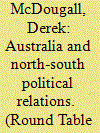

|
|
|
|
|
| Publication |
2011.
|
| Summary/Abstract |
North-South issues as such do not figure prominently in Australia's international policy but are mostly implicit. These issues arise particularly in the context of Australia's relations with countries in its immediate vicinity, including the South Pacific, Indonesia and East Timor. There are also some global issues in the North-South context where Australia is affected. Australian governments, in developing policies relating to this context, have been influenced by a 'practical realism' that puts first priority on Australian interests as perceived by governments at any given time. The way in which those policies have been developed, in both the regional and the global contexts, can be assessed through an examination of issues relating to security and international economic relations. Australia's alliance relationship has a strong bearing on the way Australia approaches the security issues. In relation to international economic issues there are many commonalities with fellow producers of raw materials in the Global South.
|
|
|
|
|
|
|
|
|
|
|
|
|
|
|
|
| 2 |
ID:
108149
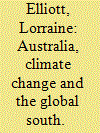

|
|
|
|
|
| Publication |
2011.
|
| Summary/Abstract |
Australia's climate change relationship with developing countries is framed by the 1992 United Nations Framework Convention on Climate Change and the 1997 Kyoto Protocol. Under those agreements, Australia has committed to take a lead in cutting greenhouse gas emissions and to provide technological and financial support to developing countries. In practice, Australian governments of both political hues have adopted a somewhat ambiguous and ambivalent attitude to developing countries within climate change politics and their fulfilment of those commitments has been uneven. This is particularly so if the concept of the 'Global South' is expanded from developing countries to include those people who are vulnerable to the environmental, social and economic impacts of climate change.
|
|
|
|
|
|
|
|
|
|
|
|
|
|
|
|
| 3 |
ID:
108144


|
|
|
|
|
| Publication |
2011.
|
| Summary/Abstract |
Like many states in the Global South, the Australian economy relies heavily on the natural resource sector for a large proportion of its export earnings. Four decades ago, this basic similarity eventually induced Australian governments to become 'fellow travellers' with the G77 quest for a new international economic order. When that quest was put to rest by the rise of neo-liberalism, Australian governments then became fervent believers in free rather than managed trade; but in the contemporary era where neo-liberalism is now a dying policy creed, Australia's current resource boom begs the question of whether the time is now ripe for Canberra to reinvent this role. What the rationales might be for that 'back to the future' policy move is explored in the context of Australia's iron ore trade with China.
|
|
|
|
|
|
|
|
|
|
|
|
|
|
|
|
| 4 |
ID:
108142
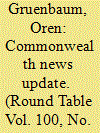

|
|
|
|
|
| Publication |
2011.
|
| Summary/Abstract |
A growing scandal over phone-hacking, alleged bribery of senior police officers and the use of convicted private investigators to obtain private information illegally enveloped Rupert Murdoch's global media empire, News Corporation. Murdoch and his son James were questioned by MPs as pressure grew in Britain, and abroad, to curb the tycoon's dominant role. Malta voted to legalise divorce. A corruption inquiry called for action against South Africa's police chief, an ally of President Jacob Zuma. Nearly 1,400 protesters were arrested and a dozen injured, including opposition leader Anwar Ibrahim, as 20,000 people demanded electoral reform in Malaysia, while at least 18 people were killed during two days of public unrest in Malawi. A policeman was jailed for using a toilet reserved for Zimbabwe's President Robert Mugabe.
|
|
|
|
|
|
|
|
|
|
|
|
|
|
|
|
| 5 |
ID:
108146
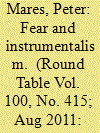

|
|
|
|
|
| Publication |
2011.
|
| Summary/Abstract |
Immigration and border protection policies are driven by national interest. However, the national interest can be more broadly and more narrowly conceived, depending in part on the degree to which the future of the individual state is understood to be contingent on a shared global future and on the recognition that the short-term costs of international cooperation may bring long-term collective benefits. Whereas such global interdependence is recognised in international statecraft in the domains of aid, trade and climate change, such recognition does not extend to immigration. Australia's national policies towards human movement from the Global South tend to be driven in large part by exaggerated fears (of unregulated border crossings) or a narrowly instrumental approach to the economic benefits of human capital transfers (migrants filling skills gaps and providing flexibility in the labour market). A broader conception of migration would take into account the potential developmental benefits of human movement for source nations and for migrants themselves.
|
|
|
|
|
|
|
|
|
|
|
|
|
|
|
|
| 6 |
ID:
108145
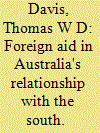

|
|
|
|
|
| Publication |
2011.
|
| Summary/Abstract |
In identifying the determinants of Australia's foreign aid relationship with developing countries (sometimes labelled 'the South'), this article examines the institutional history of official Australian development assistance since the Second World War. Several, often competing, narratives are delineated. These include: an ongoing questioning within the aid 'policy community', such as it is, of the purpose of foreign aid and the nature of its relationship to foreign policy; bureaucratic contestation over access to foreign aid resources; the desire of Australian foreign aid decision-makers to ensure their control, increasingly via managerialist methods, of aid delivery; and an avoidance by decision-makers of viewing the South as a politically relevant entity. Taken together, these narratives portray an aid programme that has become more 'professionalised' over time, but which finds itself institutionally inhibited from engaging meaningfully with the political nature of international development relationships.
|
|
|
|
|
|
|
|
|
|
|
|
|
|
|
|
| 7 |
ID:
108147


|
|
|
|
|
| Publication |
2011.
|
| Summary/Abstract |
The history of Australian human rights policy in the developing world is chequered. Australia's most consistent contribution has been in socio-economic rights through its aid programme, and in its support for decolonisation. During the Cold War, a premium was placed on civil rights, in ideological opposition to communism. After the activism of the Evatt era from 1945 to 1949, and a hiatus until 1972, renewed engagement with multilateral institutions, in part as a way of influencing human rights in developing countries, came with the Whitlam, Fraser, Hawke/Keating and Rudd governments, while there was some retreat under the Howard government. All governments since the early 1970s have had considerable human rights successes (including through bilateral diplomacy) and some often dramatic failures; most have sacrificed human rights at some point for other strategic objectives. Governments have also struggled with their choice of means in confronting violations. There remains room for Australia to articulate a more effective human rights diplomacy.
|
|
|
|
|
|
|
|
|
|
|
|
|
|
|
|
|
|
|
|
|